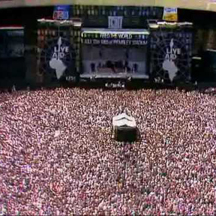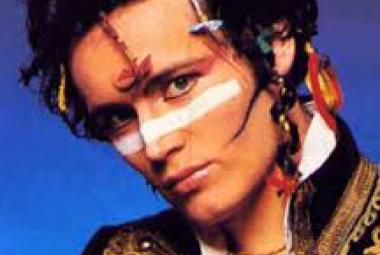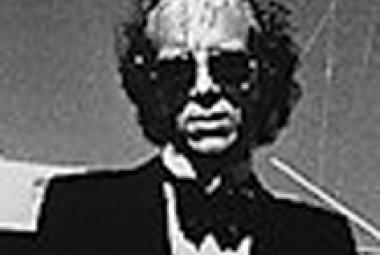LIVE AID
Live Aid was a dual-venue concert held on 13 July 1985. The event was organised by Bob Geldof and Midge Ure to raise funds for relief of the ongoing Ethiopian famine. Billed as the “global jukebox”, the event was held simultaneously at Wembley Stadium in London, England, United Kingdom (attended by 72,000 people) and John F. Kennedy Stadium in Philadelphia, Pennsylvania, United States (attended by about 100,000 people). On the same day, concerts inspired by the initiative happened in other countries, such as Australia and Germany. It was one of the largest-scale satellite link-ups and television broadcasts of all time: an estimated global audience of 1.9 billion, across 150 nations, watched the live broadcast. (More from Wikipedia)
John Fogerty’s second solo album in 1975, John Fogerty spawned a minor hit “Rockin’ All Over the World”. Also, Status Quo – a solid British rock band whose decades of blockbuster recording output are virtually unknown in this country (other than their 1967 psychedelic hit song “Pictures of Matchstick Men”) – earned a 1977 hit album, Rockin’ All over the World in the UK with Fogerty’s song as the album’s title track. The song gained even wider exposure when Status Quo opened their set at the 1985 Live Aid concert with “Rockin’ All Over the World”; they were just the second band to perform at the London portion of the event (in Wembley Stadium), and the song was used by the BBC to promote their coverage of what is one of the best known rock concert events to this day.
(January 2013)
* * *
When Joan Baez took the stage at Live Aid on July 13, 1985, she addressed the crowd: “Good morning, children of the ’80s. This is your Woodstock, and it’s long overdue.” It seemed so obvious and yet I remember being surprised at her saying it. Joan Baez of course was there in 1969 – the full name was Woodstock Music & Art Fair – and she was there whenever peaceful protest was needed also.
And Joan Baez was there beginning in 1960 when the folk music revival was in its heyday; and she wasn’t political at all in the beginning.
(February 2014)















